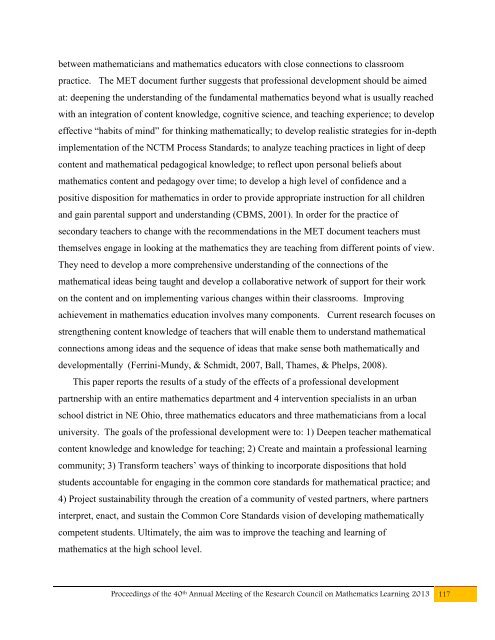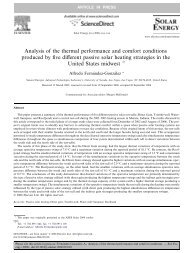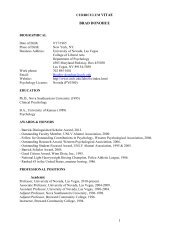2013 Conference Proceedings - University of Nevada, Las Vegas
2013 Conference Proceedings - University of Nevada, Las Vegas
2013 Conference Proceedings - University of Nevada, Las Vegas
- No tags were found...
You also want an ePaper? Increase the reach of your titles
YUMPU automatically turns print PDFs into web optimized ePapers that Google loves.
etween mathematicians and mathematics educators with close connections to classroompractice. The MET document further suggests that pr<strong>of</strong>essional development should be aimedat: deepening the understanding <strong>of</strong> the fundamental mathematics beyond what is usually reachedwith an integration <strong>of</strong> content knowledge, cognitive science, and teaching experience; to developeffective “habits <strong>of</strong> mind” for thinking mathematically; to develop realistic strategies for in-depthimplementation <strong>of</strong> the NCTM Process Standards; to analyze teaching practices in light <strong>of</strong> deepcontent and mathematical pedagogical knowledge; to reflect upon personal beliefs aboutmathematics content and pedagogy over time; to develop a high level <strong>of</strong> confidence and apositive disposition for mathematics in order to provide appropriate instruction for all childrenand gain parental support and understanding (CBMS, 2001). In order for the practice <strong>of</strong>secondary teachers to change with the recommendations in the MET document teachers mustthemselves engage in looking at the mathematics they are teaching from different points <strong>of</strong> view.They need to develop a more comprehensive understanding <strong>of</strong> the connections <strong>of</strong> themathematical ideas being taught and develop a collaborative network <strong>of</strong> support for their workon the content and on implementing various changes within their classrooms. Improvingachievement in mathematics education involves many components. Current research focuses onstrengthening content knowledge <strong>of</strong> teachers that will enable them to understand mathematicalconnections among ideas and the sequence <strong>of</strong> ideas that make sense both mathematically anddevelopmentally (Ferrini-Mundy, & Schmidt, 2007, Ball, Thames, & Phelps, 2008).This paper reports the results <strong>of</strong> a study <strong>of</strong> the effects <strong>of</strong> a pr<strong>of</strong>essional developmentpartnership with an entire mathematics department and 4 intervention specialists in an urbanschool district in NE Ohio, three mathematics educators and three mathematicians from a localuniversity. The goals <strong>of</strong> the pr<strong>of</strong>essional development were to: 1) Deepen teacher mathematicalcontent knowledge and knowledge for teaching; 2) Create and maintain a pr<strong>of</strong>essional learningcommunity; 3) Transform teachers’ ways <strong>of</strong> thinking to incorporate dispositions that holdstudents accountable for engaging in the common core standards for mathematical practice; and4) Project sustainability through the creation <strong>of</strong> a community <strong>of</strong> vested partners, where partnersinterpret, enact, and sustain the Common Core Standards vision <strong>of</strong> developing mathematicallycompetent students. Ultimately, the aim was to improve the teaching and learning <strong>of</strong>mathematics at the high school level.<strong>Proceedings</strong> <strong>of</strong> the 40 th Annual Meeting <strong>of</strong> the Research Council on Mathematics Learning <strong>2013</strong> 117




